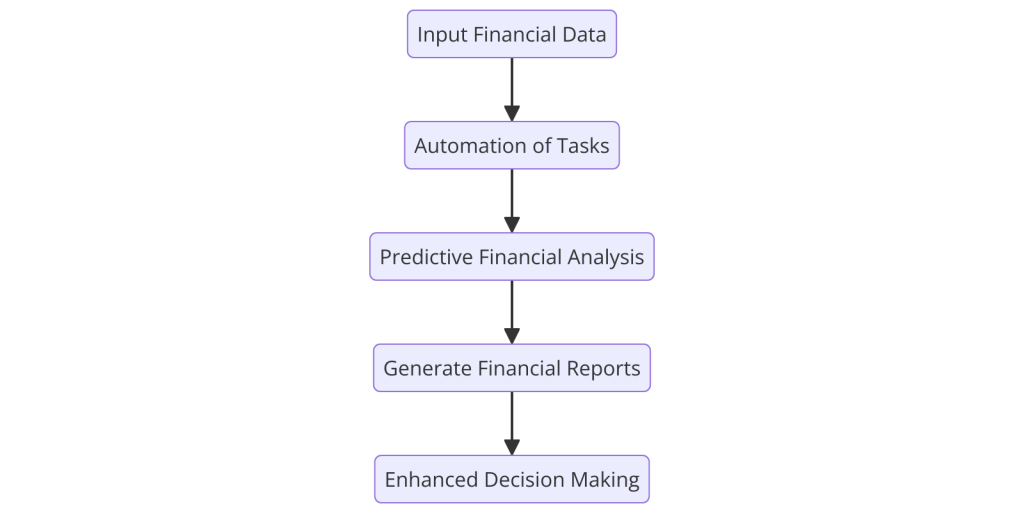BPC-AI | Le logiciel de business plan collaboratif boosté à l’IA
 +33 6 61 95 64 95
+33 6 61 95 64 95Enhanced Data Accuracy
Manual management of tasks such as invoicing, payments, and budgeting can be time-consuming.
Create your own
AI Financial Management Platform

AI Financial Management Platform: Revolutionizing Business Finance with Automation
In today’s fast-paced business world, the integration of AI financial management platforms has become essential for modern companies. These platforms are transforming how businesses handle their finances by streamlining processes, improving the accuracy of financial forecasting, and optimizing strategic decision-making.
An AI-powered financial management platform automates many of the repetitive and time-consuming financial tasks while providing advanced predictive analysis that can reshape the way businesses manage their finances. This technology is particularly valuable in a business environment where rapid adaptation to market changes, data-driven decision-making, and efficient financial management are critical for success.
What is an AI Financial Management Platform?
An AI financial management platform is a software tool or suite of tools that leverages artificial intelligence to automate, analyze, and optimize the financial management processes of a business. Unlike traditional financial software, these platforms go beyond basic accounting. They provide predictive insights based on machine learning models and sophisticated algorithms, allowing companies to gain a deeper understanding of their cash flows and foresee future financial challenges.
These platforms can process large volumes of data in real-time, generating accurate reports and improving forecasting capabilities. Additionally, they facilitate the detection of anomalies and financial risks, helping to minimize errors and fraud.
Benefits of Using an AI Financial Management Platform
Using an AI-powered financial management platform offers numerous benefits for businesses of all sizes and industries. Here are some of the key advantages:
Enhanced Data Accuracy
By automating financial processes, AI drastically reduces the chance of human error. Manual data entry and complex calculations can often lead to costly mistakes. With AI, businesses can ensure that their financial data is accurate, leading to better-informed decision-making.
Precise and Reliable Financial Forecasting
One of the major strengths of AI platforms is their ability to generate highly accurate financial forecasts. By analyzing historical data and current market trends, these tools can predict future cash flows, sales, and funding requirements. This enables companies to anticipate downturns and prepare accordingly.
Automated Accounting Processes
Manual management of tasks such as invoicing, payments, and budgeting can be time-consuming. With AI, these processes are automated, saving time and reducing operational costs. Employees can focus on higher-value tasks such as strategic analysis or client management.
Risk Analysis and Fraud Detection
AI is also highly effective in detecting unusual behaviors and anomalies in financial transactions. By analyzing large datasets in real-time, it can identify suspicious trends or fraudulent activities far more quickly than manual auditing. This enables businesses to respond to risks more rapidly and strengthen their financial security.
Optimized Cash Flow Management
AI platforms improve cash flow management by analyzing real-time cash inflows and outflows. Companies can adjust their cash flow strategies to avoid shortages or surpluses. Optimizing cash flow is crucial for maintaining financial stability and avoiding liquidity risks.

Key Features of an AI Financial Management Platform
An effective AI financial management platform offers a range of features that make financial management more efficient. These include:
Real-time Dashboards
AI platforms provide customizable dashboards that allow financial managers to gain a real-time overview of their company’s financial health. These dashboards include key performance indicators (KPIs) and financial reports that can be adjusted to meet the specific needs of the business.
Automated Financial Reporting
AI enables the automatic generation of detailed financial reports. These reports can include income statements, balance sheets, cash flow reports, and more advanced financial analyses. Automation allows businesses to produce reports faster and with greater accuracy, freeing up time for other strategic activities.
Automated Budget Management
AI-based financial platforms simplify budget management by tracking expenses and revenues automatically. They alert managers when budgets are exceeded or underutilized, helping to make informed financial decisions.
Predictive Analysis
One of the most powerful tools in an AI financial management platform is predictive analysis. By leveraging machine learning algorithms, the platform can anticipate market trends, changes in expenses and revenues, and future funding needs. This allows companies to develop more accurate financial strategies and optimize long-term planning.
How to Choose the Right AI Financial Management Platform
Selecting the right platform is crucial for meeting the specific needs of your business. Here are a few key factors to consider when choosing an AI financial management platform:
Ease of Integration
A good platform should integrate easily with other software used by the company, such as human resource management tools, customer relationship management (CRM) systems, and ERP (Enterprise Resource Planning) solutions.
Data Security
Managing financial data is a sensitive task. It’s important that the platform offers robust security measures, such as data encryption, multi-factor authentication, and access controls to ensure confidentiality.
Customization and Flexibility
Every business has unique requirements. A strong platform should allow for full customization of dashboards, reports, and processes to fit the specific demands of the company.
Support and Technical Assistance
Lastly, make sure that the platform provider offers reliable technical support and continuous assistance to resolve issues quickly and ensure smooth operation.
Conclusion
AI-powered financial management platforms are revolutionizing the way businesses handle their finances. By automating accounting processes, improving the accuracy of forecasts, and providing advanced insights, they allow companies to make better decisions and manage their resources more effectively. Whether you’re a small business or a large organization, adopting AI for financial management is a strategic choice that can enhance overall business performance while reducing costs and risks.


